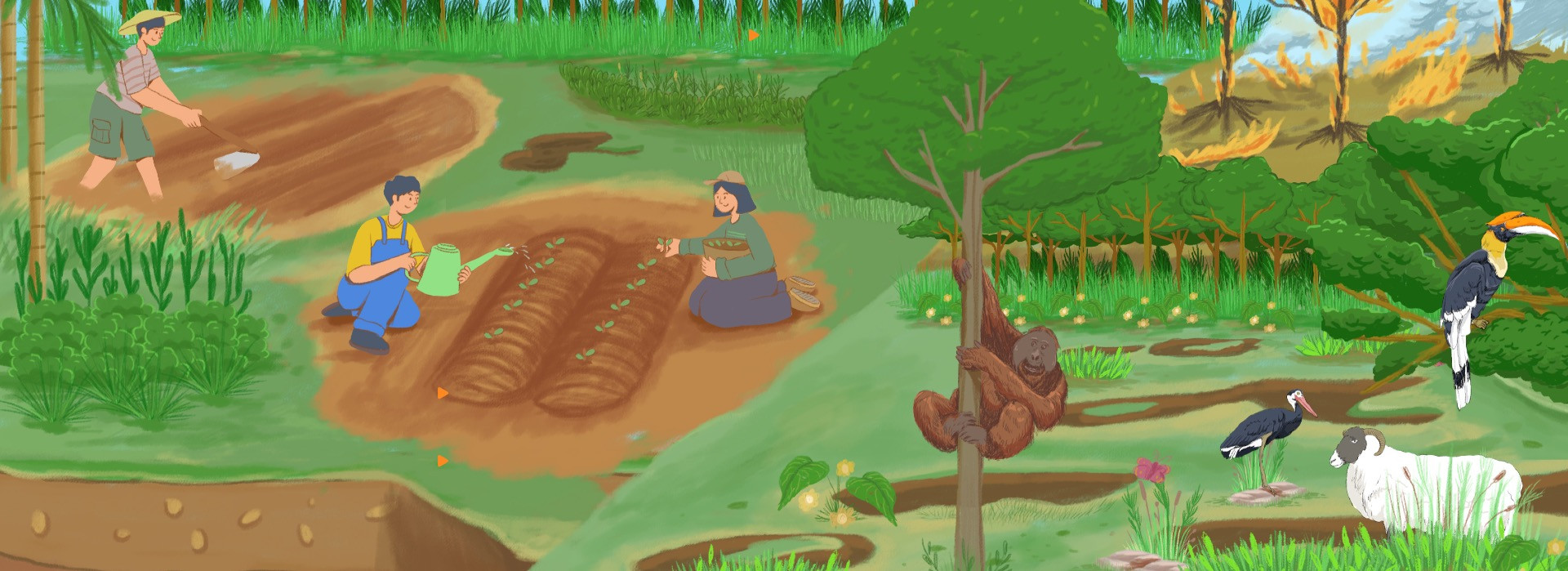Nature, People and Partnership: The FINCAPES Approach to Peatland Restoration in Indonesia
Indonesia’s peatlands—wet, swampy forest areas—are some of the most important ecosystems in the world. They help fight climate change by storing carbon, keep our water clean, and support the daily lives of millions of people. Peatlands are much more than muddy forests. They are sources of food, water, and hope for many families. When we restore them, we’re not just helping the planet—we’re also investing in better futures for the people who live there.But today, many of these peatlands are in danger. They’re being damaged by deforestation, draining, and fires.
To fix this, it is necessary to restore the land, not only for the environment but also for the people who inhabit it.
In Sungai Gelam, Jambi, the FINCAPES project, supported by the Government of Canada and implemented by the University of Waterloo in partnership with IPB University, is leading a peatland restoration initiative that combines environmental recovery with socio-economic development. By applying Nature-based Solutions (NbS), the project aims to restore degraded peatlands while also improving the well-being of local communities.
The initiative focuses on restoring degraded shrublands and developing productive agroforestry plots using sustainable practices such as paludiculture (wetland farming) and intercropping. These methods not only improve the health of peatland ecosystems but also provide alternative livelihood opportunities for farmers. Through the integration of scientific research, local capacity building, and hands-on implementation, FINCAPES is creating a replicable model for sustainable peatland management.
The initiatives in Sungai Gelam, Jambi, underscore the increasing recognition that peatland restoration requires inclusive community participation and gender-responsive strategies. FINCAPES fosters collaboration among local communities, farmers, and a range of stakeholders, including government officials, NGOs, businesses, and researchers, to facilitate mutual learning and develop enhanced strategies for peatland restoration. Multi-stakeholder forums (FGDs) and GESEI training sessions have successfully engaged diverse stakeholders, promoted meaningful dialogue, and empowered women and men to assume a more active role in restoration efforts. The synthesis of ecological knowledge, social insights, and community aspirations achieved through these activities provides a robust framework for sustainable and equitable peatland restoration.
The work in Jambi isn’t just a local project—it’s part of a bigger effort across Indonesia. The FINCAPES project is using nature-based solutions (NbS) to combine environmental restoration with income opportunities for communities.
Integrating science, local knowledge, and multi-stakeholder partnerships, the FINCAPES project highlights the importance of combining Nature-based Solutions with participatory planning, alternative livelihoods, and gender equity. To expand successful restoration efforts throughout Indonesia, future initiatives must prioritize the sustained engagement of women, the responsiveness to local needs, and the development of economic resilience through alternative commodities.
Unlock key insights on peatland restoration from our multi-stakeholder think tank: Towards Sustainable Peatland Management in Indonesia, Strategies for Restoration and Revitalization
Report on Biophysics and Social Economy Assessment: Restorasi Gambut di Desa Sungai Gelam: Laporan Analisis Biofisik dan Sosial Ekonomi
Plus, download our tool for conducting GESEI training sessions for your community: Mengenal Kesetaraan Gender
